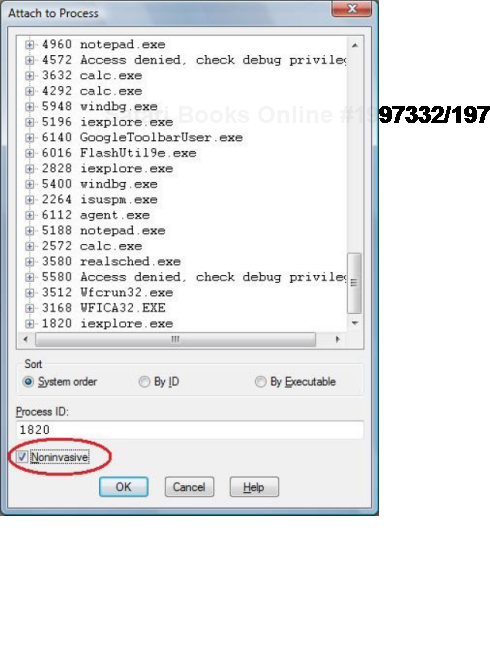Some troubleshooting and debugging tools show numbers in hex and some in decimal even for things that are traditionally hex, for example PID and TID. Then, when getting data from one program we need to convert it to a different base for another tool. So over some time it is possible to get an idea of what hex numbers usually are even if they don't have hexadecimal 'A'-'F' in their digits. For example, in one log we got this output:
Parent changed to 393954
Although this number is a valid hex number as well as a decimal we had the intuitive feeling that it was decimal... Checking source code of the tool revealed that it was output as decimal indeed.
Recently I was asked how to measure complexity of technical support cases especially ones that require memory dump analysis. My first response was that it is a subjective qualitative measure based mostly on experience and feeling. However, after careful consideration, I understood that nothing has changed for many years: the nature and causes of system or application hangs and crashes still the same regardless of OS types and versions. Therefore the complexity measure shifts from a case description and its artefacts to an analyst, a memory dump reader. Here the number of queries, questions asked or commands executed to gather information for analysis, can be a good approximation to the measure of complexity. For example, many years ago I started with a few commands like !analyze -v, kv and dd and progressed to an elaborate check-list (Appendix B). Here the natural logarithm_can be used to approximate the measure:
C = ln (Ndc), where Ndc is the number of debugging commands used.
Initially, the complexity was ln (3) ≈ 1.1 and now, if someone uses 10 commands on average or asks 10 questions, the complexity is ln (10) ≈ 2.3. The analysis is more than 2 times complex than it was.
One question often asked is to how to simulate a process hang. One method that we found is to attach WinDbg noninvasively, freeze all threads by executing the following command:
and then quit by using q command. This leaves an application or a service process in a total hang state.

A local browser crashed when doing copy-paste of an RTF text into an HTML editor window. The dump was not saved because logging was set up as described in Volume 2, page 38 (and the script didn't include .dump commands).
Looking at stack trace we noticed that the crash happened during HTML processing (call arguments are removed for visual clarity):
STACK_TEXT: 0476de3c 6970d597 html!FPseudoStyleBis+0x26 0476de48 69703b0e html!BisFromLpxszStyle+0x1c 0476de60 69702ba9 html!LwMultDivRU+0x4b6 0476dea4 6970518a html!FMarkListCallback+0x56c 0476deb4 697068b7 html!JcCalcFromXaExtents+0x91 0476df60 697070c5 html!EmitNonBreakingSpace+0x445 0476e08c 697107ff html!FEmitHtmlFnOtag+0x17d 0476e0b0 696ec6a8 html!ConvertRtfToForeign+0x105 0476e538 696ec745 html!FceRtfToForeign+0x266 0476e560 6b7e5ad4 html!RtfToForeign32+0x51 0476e9a8 6b7e5c83 mshtmled!CRtfToHtmlConverter::ExternalRtfToInternalHtml+0x163 0476edfc 6b79cc15 mshtmled!CRtfToHtmlConverter::StringRtfToStringHtml+0x11a 0476ee18 6b79cd81 mshtmled!CRtfToHtmlConverter::StringRtfToStringHtml+0x38 0476ee2c 6b7cdcea mshtmled!CHTMLEditor::ConvertRTFToHTML+0x12 0476ee98 6b7ce392 mshtmled!CPasteCommand::PasteFromClipboard+0x2c0 0476ef08 6b78d218 mshtmled!CPasteCommand::PrivateExec+0x47a 0476ef2c 6b78d1ad mshtmled!CCommand::Exec+0x4b 0476ef50 6b470d14 mshtmled!CMshtmlEd::Exec+0xf9 0476ef80 6b4688a8 mshtml!CEditRouter::ExecEditCommand+0xd6 0476f328 6b5ceccf mshtml!CDoc::ExecHelper+0x338d 0476f374 6b468a2f mshtml!CFrameSite::Exec+0x264 0476f3a8 6b4687af mshtml!CDoc::RouteCTElement+0xf1 0476f740 6b468586 mshtml!CDoc::ExecHelper+0x325e 0476f760 6b510e7b mshtml!CDoc::Exec+0x1e 0476f798 6b48a708 mshtml!CDoc::OnCommand+0x9c 0476f8ac 6b3997e1 mshtml!CDoc::OnWindowMessage+0x841 0476f8d8 766ff8d2 mshtml!CServer::WndProc+0x78 0476f904 766ff794 USER32!InternalCallWinProc+0x23 0476f97c 767006f6 USER32!UserCallWinProcCheckWow+0x14b 0476f9ac 7670069c USER32!CallWindowProcAorW+0x97 0476f9cc 6ce1851b USER32!CallWindowProcW+0x1b WARNING: Stack unwind information not available. Following frames may be wrong. 0476fa40 6ce0cdc6 GoogleToolbarDynamic_6D0D6FD66D664927!DllGetClassObject+0x24981 0476fa64 6ce9beaa GoogleToolbarDynamic_6D0D6FD66D664927!DllGetClassObject+0x1922c 0476fa94 766ff8d2 GoogleToolbarDynamic_6D0D6FD66D664927!DllGetClassObject+0xa8310 0476fac0 766ff794 USER32!InternalCallWinProc+0x23 0476fb38 76700a05 USER32!UserCallWinProcCheckWow+0x14b 0476fb78 76700afa USER32!SendMessageWorker+0x4b7 0476fb98 6b47fb9b USER32!SendMessageW+0x7c 0476fbc4 6b3d8e5a mshtml!CElement::PerformTA+0x71 0476fbe4 6b3d8db9 mshtml!CDoc::PerformTA+0xd8 0476fc60 6b46381c mshtml!CDoc::PumpMessage+0x8e0 0476fd14 6b463684 mshtml!CDoc::DoTranslateAccelerator+0x33f 0476fd30 6b4634cc mshtml!CServer::TranslateAcceleratorW+0x56 0476fd50 70c9f550 mshtml!CDoc::TranslateAcceleratorW+0x83 0476fd6c 70c9f600 IEFRAME!CProxyActiveObject::TranslateAcceleratorW+0x30
0476fd90 70c9fca1 IEFRAME!CDocObjectView::TranslateAcceleratorW+0xb1 0476fdb0 70c9faf4 IEFRAME!CCommonBrowser::v_MayTranslateAccelerator+0xda 0476fddc 70c9f7b0 IEFRAME!CShellBrowser2::_MayTranslateAccelerator+0x68 0476fdec 70c9f7f5 IEFRAME!CShellBrowser2::v_MayTranslateAccelerator+0x15 0476fe58 76894911 IEFRAME!CTabWindow::_TabWindowThreadProc+0x264 0476fe64 776ae4b6 kernel32!BaseThreadInitThunk+0xe 0476fea4 776ae489 ntdll!__RtlUserThreadStart+0x23 0476febc 00000000 ntdll!_RtlUserThreadStart+0x1b
In Andreas Zeller's book Why Programs Fail[40] a browser parsing HTML was used as an example to show delta debugging[41].
The complete log file can be downloaded from this link:
http://www.dumpanalysis.org/blog/files/HTMLProcessingCrash.log
Consider this crash point:
0:000> r eax=02d0f15c ebx=02a62918 ecx=77e41c30 edx=00000000esi=ffffffffedi=02a8ed28 eip=76154193 esp=02d0f124 ebp=02d0f130 iopl=0 nv up ei pl zr na pe nc cs=001b ss=0023 ds=0023 es=0023 fs=003b gs=0000 efl=00010246 Application!GetData+0xb: 76154193 8b9eac000000 mov ebx,dword ptr [esi+0ACh] ds:0023:000000ab=????????
Seeing 000000ab address we can think that ESI was 0 but it is 0xFFFFFFFF as we can see above. Adding 0xAC to it produced an effective NULL data pointer (page 131) 0xAB through integer addition overflow if we consider addition as unsigned. It is easy to see the result if we consider 0xFFFFFFFF as signed -1. Looking at stack trace and function disassembly we see that 0xFFFFFFFF was passed as a parameter:
0:000> kv ChildEBP RetAddr Args to Child 02d0f130 7616328dffffffff02d0f15c 02d0f150 Application!GetData+0xb [...] 02d0ffec 00000000 740420d8 02a74070 00000000 kernel32!BaseThreadStart+0×34 0:000> u Application!GetData Application!GetData: 76154188 mov edi,edi 7615418a push ebp 7615418b mov ebp,esp 7615418d push ecx 7615418e push ebx 7615418f push esi76154190 movesi,dword ptr [ebp+8] 76154193 movebx,dword ptr [esi+0ACh]
This is an example of a sentinel pointer marking the end of a linked list, although NULL pointers having 0 values are usually used. Also -1 value can be used to assign an invalid pointer value (Volume 1, page 267).
This is a stack trace (backtrace) where all finctions are removed and only modules are left. It is useful for depicting component dependencies. Here is an example:
0: kd> kc 100 nt!KiSwapContext nt!KiSwapThread nt!KeDelayExecutionThread 3rdPartyAVDriver 3rdPartyAVDriver 3rdPartyAVDriver 3rdPartyAVDriver nt!IofCallDriver DriverA!Dispatch DriverA!KUI_dispatch nt!IofCallDriver DriverB!PassThrough DriverB!Dispatch nt!IofCallDriver DriverC!LowerPassThrough DriverC DriverC DriverC DriverC!DispatchPassThrough nt!IofCallDriver nt!IopParseDevice nt!ObpLookupObjectName nt!ObOpenObjectByName nt!IopCreateFile nt!IoCreateFile nt!NtOpenFile nt!KiFastCallEntry ntdll!KiFastSystemCallRet ntdll!NtOpenFile ntdll!LdrpCreateDllSection ntdll!LdrpMapDll ntdll!LdrpLoadDll ntdll!LdrLoadDll kernel32!LoadLibraryExW kernel32!LoadLibraryW ntdll!LdrpCallInitRoutine ntdll!LdrpRunInitializeRoutines ntdll!LdrpLoadDll ntdll!LdrLoadDll kernel32!LoadLibraryExW kernel32!LoadLibraryW USER32!LoadAppDlls USER32!ClientThreadSetup USER32!__ClientThreadSetup ntdll!KiUserCallbackDispatcher nt!KiCallUserMode
nt!KeUserModeCallback win32k!xxxClientThreadSetup win32k!xxxCreateThreadInfo win32k!UserThreadCallout win32k!W32pThreadCallout nt!PsConvertToGuiThread nt!KiBBTUnexpectedRange
Collapsed stack trace is much simpler to grasp:
nt 3rdPartyAVDriver nt DriverA nt DriverB nt DriverC nt ntdll kernel32 ntdll kernel32 USER32 ntdll nt win32k nt
